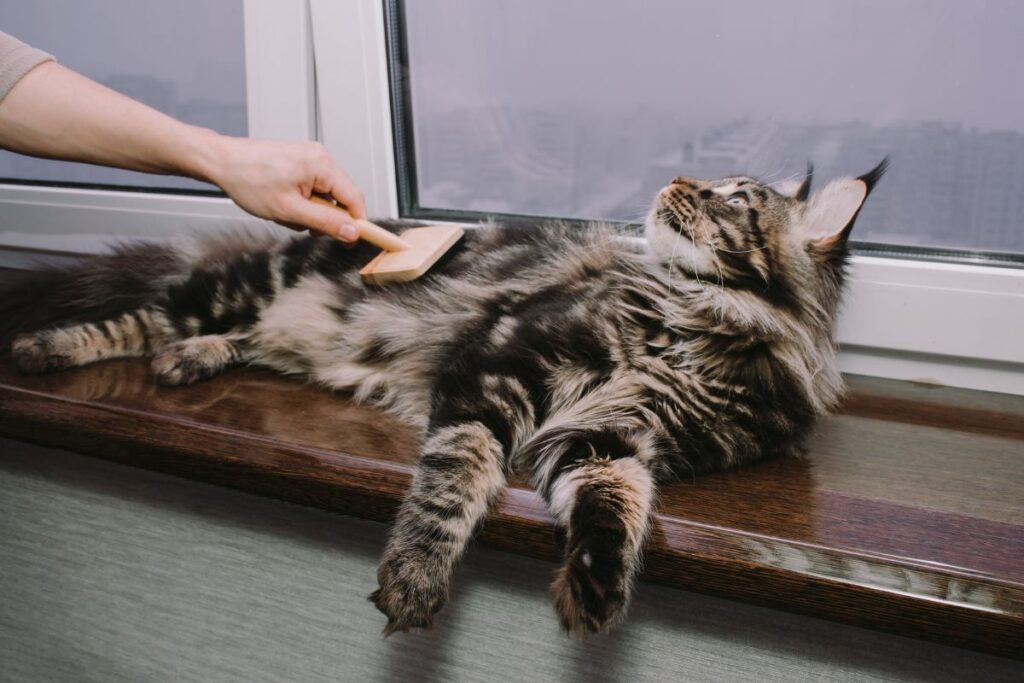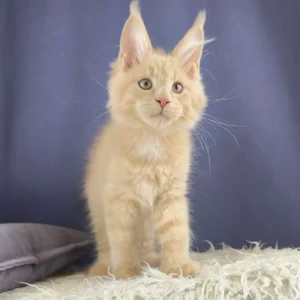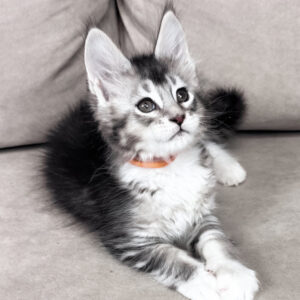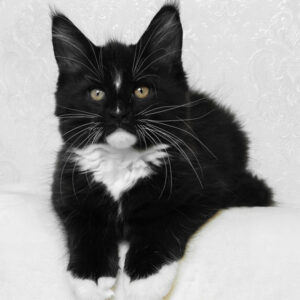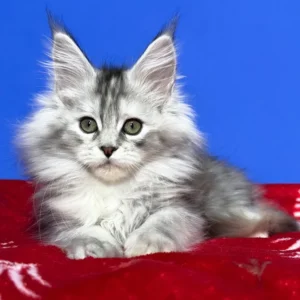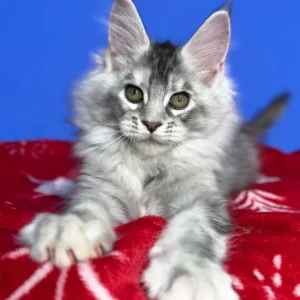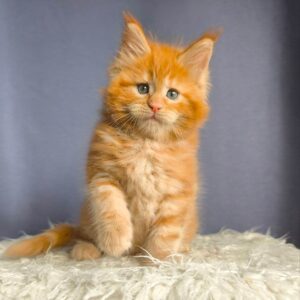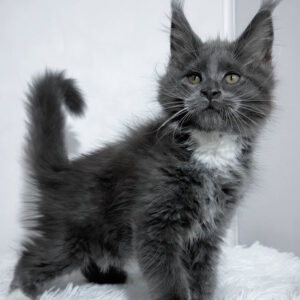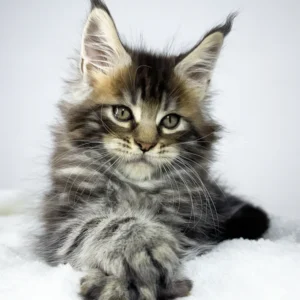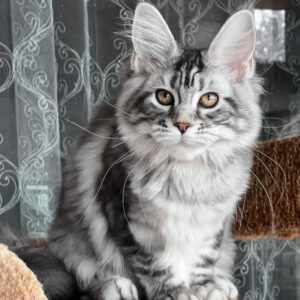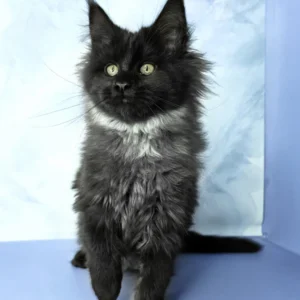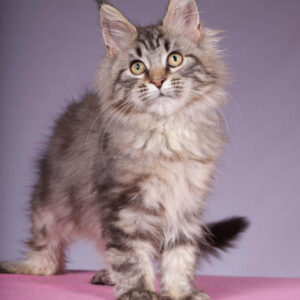Maine Coon Grooming Tips 101
Famous for their thick, long, and luscious coats, the friendly Maine Coons are as adorable as they are gorgeous. Their fur doesn’t only look majestic it serves as a protective layer between your cat’s skin and the outside world na needs very careful Maine Coon Grooming.
Besides beauty rituals, nutrition can significantly improve the health and appearance of your feline companion’s coat. Untamed offers some handy tips to raise a beautiful, healthy, and happy Coon.
Is grooming a Maine Coon cat necessary?
Maine Coons need assistance to keep their long coat pretty. When left to fend for themselves, Coons can only clean the top layers of their fur.
If you don’t take care of your kitty regularly, their undercoat will become matted and dirty. It’ll also tug on their skin, causing various problems from rashes to inflammation. Besides looking unappealing, skin and coat issues can be painful for your furry friend.
Available Kittens
How to groom your Maine Coon’s cat?
To maintain a shiny coat and prevent tangles and matting, your Maine Coon’s grooming routine should include:
- Brushing
- Claw clipping
- Teeth brushing
- Bathing
Brushing
Ideally, you should brush your Maine Coon two to three times per week, removing any loose hair and dander (flakes of dead skin) and keeping your kitty’s coat clean, healthy, and free of knots.
Don’t skip grooming sessions because matting is unhygienic and can cause psychological distress. Cats like their coat clean and untangled
During the damp winter days, Maine Coons’ fur needs special attention. They shed less, so their coats become extra dense, making the undercoat prone to knotting and tangling.
Choosing the right brush for your kitty makes grooming more efficient and comfortable. A soft bristle brush is the best option because wire brushes can scratch your Maine Coons’ skin, causing tears and making future grooming sessions challenging. Soft brushes prevent the fur from matting and tangling without harming or irritating your kitty.
Claw clipping
If your Maine Coon spends their time indoors, their claws will get too long if left unattended. Clipping your cat’s nails can be uncomfortable for both parties, but it is necessary. In case you’re unsure of your clipping skills, take your Maine Coon to a groomer.
The essential tools for this segment of the grooming routine are:
Tools | How to use |
Clippers | Be careful while trimming your Maine Coon’s nails—you should only clip the very tip of their nail. Pay attention not to reach the sensitive nerve endings |
Grinder | Nail grinders are a great alternative to clippers since the risk of harming your feline is minimal. Press it on the tip of your kitty’s nails without any manual effort and buff until you’ve reached the desired length |
File | Filers are soft and gentle, don’t make any noise, and allow you to control how much you file off. Filing takes longer than other methods, which could make your kitty a bit crabby, so pair it with clippers or a grinder and use it as a finish |
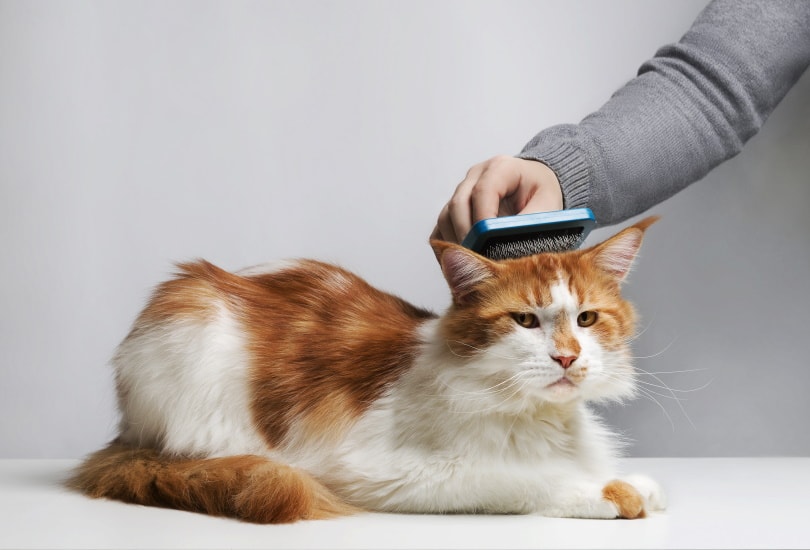
Scratching posts can make things easier. Your Maine Coon will keep their claws blunt and file them naturally during playtime. They’re also less likely to scratch your furniture if they have a scratching post.
Teeth brushing
Your Maine Coon’s dental hygiene affects their dental health and general well-being. If neglected, dental diseases can lead to more serious conditions. Oral bacteria can spread to the heart, liver, and kidneys leading to endocarditis, valvular disease, and other heart problems.
Ideally, you should brush your Maine Coon’s teeth every day using a vet-approved toothbrush. Feeding them a high-quality diet and dental food also plays a significant role in maintaining their gums and teeth.
To bathe or not to bathe?
Most other breeds, such as Persian and Norwegian Forest cats, get fussy around water, but Maine Coons are mesmerised by it and tend to enjoy baths.
In regular circumstances, you should wash your Maine Coon once a month. Human products can be harmful to kitties, so use a specially formulated feline shampoo and conditioner. Bathing also helps cats get rid of knotted hair and dead skin.
If your Maine Coon gets dirty (e.g. sprayed by a skunk), you should wash them thoroughly regardless of how recent their last bath was.
Grooming a fussy Maine Coon—how to tame your kitty?
Maine Coons are gentle, affectionate, and usually love grooming, but they also have fussy periods. To ensure good behaviour and a stress-free grooming ritual:
- Begin with the sessions when your kitty is young—Maine Coons enjoy all the attention they can get, and they’ll get used to brushing and won’t be fussy or misbehave. It’s best to start grooming your feline during kittenhood so that they’re comfortable and familiar with the process. Cuddling and bonding while brushing is advisable
- Stick to a schedule—Once you make grooming a familiar ritual, stick to the schedule. Your kitty’s fur won’t get too messy and tangled, and they’ll stay accustomed to the process
- Use treats—Training your feline to sit still and be obedient doesn’t always work—sometimes, you need to resort to other measures. Using healthy treats to keep them calm and get through a grooming session will make your job a lot easier
Shedding and Maine Coons—how much is too much?
Maine Coons come in various colours, fur lengths, and densities. Their shedding frequency is also individual.
Some general factors, such as the weather, affect your Maine Coon’s shedding schedule. Since kitties adapt to the outside climate, your feline companion will shed differently throughout the year.
As winter approaches, your cat’s coat should become denser to keep them warm and cosy. Once the spring comes, the shedding will begin to increase in preparation for warmer days.
How much your Maine Coon sheds also depends on:
- Genetic predisposition
- Whether they suffer from allergies
- Dietary habits
- Overall health
- Whether they live indoors or outdoors
- Exposure to stress
Keep in mind that there’s a difference between shedding and losing hair. Regular grooming will allow you to keep track of how much hair your Maine Coon usually loses. If the amount increases dramatically, it can be a sign of:
- Underlying health issues—Ringworms, thyroid disbalance, obesity, and allergies could cause your feline to lose fur at an alarming rate. Make sure to feed your Maine Coon healthy and nutritious food to keep them in tip-top shape
- Inadequate diet—If you let your feline roam outside, they could ingest poisonous and harmful substances, leading to serious health problems. A diet rich in sugar, grains, carbs, and other useless nutrients could also be the cause of your kitty’s hair loss
- Inappropriate grooming—Failing to regularly groom your kitty or using tools that hurt their fur and skin could cause their hair to fall out
Shaving a Maine Coon—is it ever okay?
Maine Coons’ fur protects them from the outside world, so it’s better not to shave it.
If their coat has become so matted that it cannot be untangled with a brush, you should turn to alternative de-matting methods, such as shaving. Consult with a vet or professional groomer before resorting to shaving.
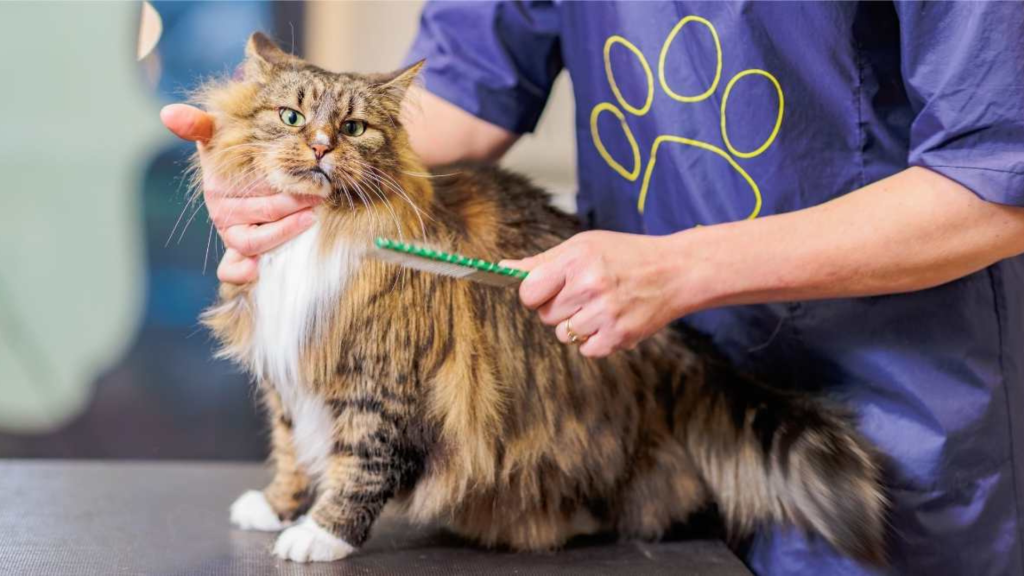
Minimise shedding and maintain a glossy coat with a proper diet
The best way to keep your Maine Coon’s coat healthy, reduce shedding, and prevent any health niggles is to groom them regularly and feed them sufficient amounts of nutritious food closely resembling what felines eat in the wild. Two primary nutrients should be:
- Animal protein
- Animal fat
Animal protein
Felines are the opposite of vegans and cannot live a long and healthy life on a plant-based diet. Vegetables are not only tough to digest but fail to meet your Maine Coon’s protein needs because cats cannot break plant protein.
Animal protein provides your kitty with essential amino acids—like taurine and arginine—that support:
- Hair growth and repair
- Muscle development
- Proper organ function
The biological value of a specific protein source is the efficiency with which your cat can extract essential nutrients from it. Check out the following table for biological values of the most common protein sources:
Protein type | BV |
Animal protein: | 88%–98% |
Vegetable protein: | 45%–68% |
Feline’s coat is made up of 98% protein, so meals rich in animal protein will help their hair grow and stay shiny well into their senior years.
Animal fat
Animal fat is an excellent secondary source of energy for felines. It provides essential fatty acids, such as linoleic acid, arachidonic acid, and omega-3 and omega-6 acids, which:
- Regulate your cat’s inflammatory response
- Keep your Maine Coon’s coat shiny
- Help felines repair skin abrasions
Fat also makes food tasty for felines, so even fussy cats can’t resist it.
Your Maine Coon’s diet should be high in protein (over 50%) and contain up to 20% animal fat for a sleek coat, reduced shedding, and general well-being.

